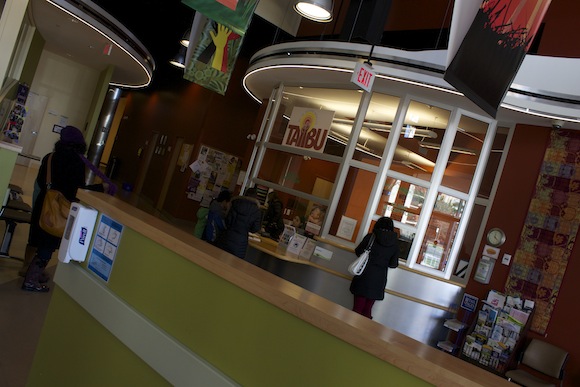
Ulysse Guerrier, community health clinic worker and sickle cell anemia survivor at the TAIBU clinic in Malvern, Ontario
As the saying goes, “The family that eats together stays healthy together.”
Ulysse Guerrier has heard the saying countless times from “healthy” families who he knows, in reality, are too ashamed to tell doctors they need help.
Guerrier is a community health worker at TAIBU, a health centre located in Scarborough. Guerrier says TAIBU hopes to change this type of thinking through its sickle cell coalition network, a program designed to educate Toronto-area families that they may be carriers for the genetic blood disease.
“One of the most important things is for people to get tested and know their status; a lot of people in the community don’t know they may be carrying the disorder,” Guerrier said.
Created in 2010, the sickle cell network provides follow up health care and support for sickle cell anemia patients and their families, including those recently discharged from hospital.
According to Guerrier, TAIBU offers local residents regular medical assessments, as well as on site doctors. In addition, the centre has weekly support groups for people who carry the sickle cell trait, who may wish to have children.
“We deal with different topics, and people from various backgrounds and age groups, and try to figure out the logical question which is, ‘What is sickle cell and how do you live with it’?” Guerrier said.
Known as a hereditary disease, sickle cell anemia is a non-curable cell disorder that attacks the blood stream and cuts down on oxygen delivered to the body. This can cause joint pain throughout the body as well as shortness of breath and bone and lung infection.
While anyone can carry sickle cell, it is commonly found in the African community. Despite attracting a growing number of patients to his TAIBU clinic, Guerrier feels that because of the perceived stereotype that sickle cell is a shameful, black-only disease, a number of cases go unreported.
“In the community, there is a stigma in terms of people saying ‘I don’t have that in my family’ or won’t admit it because they feel their family is supposed to be healthy, not sick or weak and this doesn’t help anything,” he said.
According to statistics from the Sickle Cell Association of Ontario, if both parents carry a sickle cell gene, with each pregnancy there is a one in two chance the child could receive a sickle cell trait, and a one in four chance the child could be born with the actual disease.
For Guerrier, 27, this is an issue because if the parents are unaware that they are carriers, it’s the child who suffers most; an experience Guerrier knows firsthand.
“I was born with sickle cell. I was always sick growing up and my parents didn’t know why, so we went from hospital to hospital and eventually we came across a doctor who diagnosed me and helped me,” Guerrier said.
For Dr. Michelle Reece-Mills, a Toronto-trained pediatric hematologist now based in her native Jamaica, Guerrier’s story is a common one, and serves as a key incentive for her work in the expansion of the Hospital for Sick Kids’ paediatric cancer and blood program.
“In Canada, we’re now seeing [many] more people come forward but we still have a lot of people who aren’t identified early enough or get[ting] treatment they need or too late in adulthood,” Reece-Mills said.
Much like TAIBU, Sick Kids’ pediatric blood program is part of a growing effort focused on battling sickle cell in Toronto. However, the Hospital for Sick Children wants to be one of the first hospitals in Canada to launch a pre-emptive strike in identifying newborn sickle cell anemia carriers, so patients won’t have to rely solely on community health centres.
According to Reece-Mills, who is Jamaica’s only full time specialist in the field, Sick Kids is using new software called POND to identify youngsters who are affected by sickle cell.
Created in 2009, the Pediatric Oncology Network Database can monitor a child who is admitted to hospital, and record the treatment they receive. This means when a child is identified for a sickle cell trait, parents can be notified quicker, so the appropriate treatment can be provided. The POND database has started to expand and currently registers patients from Jamaica and other Caribbean countries.
Both Reece-Mills and Guerrier – now fully stable – hope these initiatives bring more attention to sickle cell anemia.
“It’s not only a black people disease, it affects people everywhere,” Guerrier said. “However, a lot of work needs to be done in making more people aware of it, but the hope is that more people make their status known and make the informed decision whether they want to start a family.”


Hi Mr guerrier.
i read your information and agree that we as black, people always leave things till it is too late i my self is a sickler i live in london and we have a sickle cell group and we have the same problem,getting people to speak of their condition are even to get tested,as you stated is not only black people with this dease .they also have sickle beta thal it is time we look after our health,and not wait on others they have their own problem.